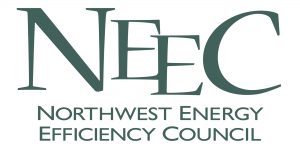The “short session” of the Washington State Legislature began the 2nd week of January. In this second year of the biennium, the Legislature has a 60 day shot clock. As expected, budget woes dominate much of the early attention. However, a number of issues of interest to the energy efficiency community are in play.
The Jobs Act – a bill (HB 2156) introduced by Rep. Hans Dunshee is an eye popping general bond authorization bill allowing the state to issue $850M in bonds (expected to leverage another $1.5B) for investment in energy efficiency in public schools, universities, and other public buildings. A total of over $2B of investment capital would create thousands of new jobs and save an estimated $190M in energy savings. HB 2156 was the first piece of legislation to pass the House of Representatives in this session. A companion bill has been introduced in the Senate (SB 6547) by Sen. Derek Kilmer. SB 6547 was directed to the Ways and Means Committee where it awaits a hearing. A strong constituency of business, labor, schools groups, and environmentalists are in strong support. NEEC has this as a legislative priority and our governmental affairs firm has been actively engaged in this support. Senate support for this bill is crucial. Please call your Senator right away and indicate your support of SB 6547 – The Jobs Act. You can find your Senator’s phone number on the directory at www.leg.wa.gov
Energy Efficiency Financing and Utility Cost Recovery – HB 2853/SB 6656 would create the authority for municipalities (cities, counties, and districts) to issue bonds to provide financing for energy efficiency investments in homes and businesses. It would allow building owners to secure those loans against the property and provide for loan re-payment on the utility bill. Municipalities could sell those loans into a third party market to regenerate the capital pool for additional lending. The authority for this conservation activity would be in state statute that empowers utilities in the state to make loans to private interests. This is one of the few exceptions to Washington State’s constitutional ban on public gifting for private interests. Language in the bill would obligate these municipalities to “coordinate” with the serving utility which may also provide financial incentives to these projects. This bill contains a separate section which directs the Washington Utilities and Transportation Commission to provide a rate of return for investor owned utilities on their expenditures for conservation. The problem of “lost margin” and “lost revenues” has historically been a disincentive for IOU conservation spending. While the low cost of energy efficiency as a resource has been widely acknowledged, the regulatory framework has not evolved in pace with this fact. Some significant opposition has surfaced to both the financing and the rate reform components of the bill. NEEC supports both aspects of this legislation. (See story on PSE below for additional details on this legislation.)
I-937 – There is continued interest and discussion regarding I-937 statute in Olympia this session. HB 3034/SB 6672 have been introduced which amend the statutory language of the initiative – primarily around renewable energy. A number of parties are suggesting additional amendatory language and the fate of this effort is far from certain. NEEC continues to support a change to the statute to allow for increments of conservation achieved over a utility’s biennial conservation target to be used to meet a portion of that utility’s renewable portfolio standard.
 The Northwest Energy Efficiency Council transitioned to the name Building Potential in 2024. The organization’s legal name remains the same and the Board of Directors and Staff have not changed. The Northwest Energy Efficiency Council transitioned to the name Building Potential in 2024. The organization’s legal name remains the same and the Board of Directors and Staff have not changed. |